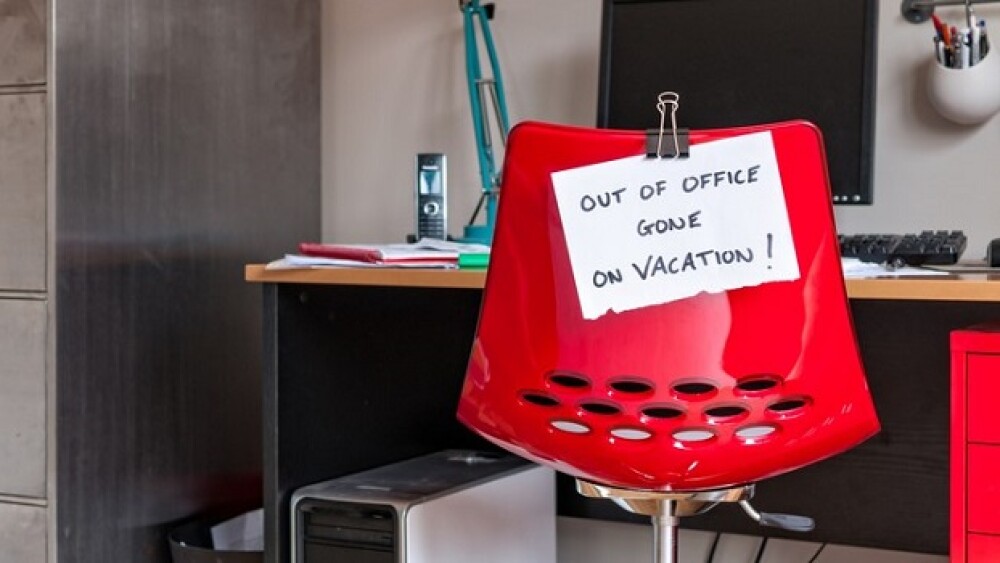If your personal life has taken a backseat, it might be time to use your paid time off. Learn everything you need to know about PTO and how to request it in our guide.
The note shows an employee took paid time off for vacations.
You’ve been working hard. You’re putting in the extra hours, taking on new projects, and proving you’re an essential member of the team. But at what cost? Your personal life has taken a backseat to your career, and you’re starting to feel it. You haven’t taken any paid time off for vacations just because of work and now you feel the burnout.
In the aftermath of COVID-19, many professionals are all too familiar with this scenario, especially those working in the pharma industry. If you’re someone who can relate, it might be time for a vacation.
But before you can truly relax, there’s some planning to be done. How much vacation time do you have? What is your company’s policy on vacation days? Do you need to use all of your vacation days at once or can you spread them out throughout the year?
The average American worker gets about 10 paid vacation days (paid time off) per year. But according to a 2018 report by USTravel.org, more than half of Americans don’t even use their vacation days.
It’s also worth noting that the United States is one of the only western countries that doesn’t legally mandate paid vacation days. This means that it’s up to individual companies to decide whether or not to offer paid vacation days to their employees, and even then, many employers can be stingy with how many days they offer or grant. As a result, it’s important to know your company’s policy and come prepared to make a case for why you deserve some time off.
So take a deep breath, relax, and let’s figure out that PTO.
What is Paid Time Off (PTO)?
First things first: what is PTO? PTO stands for paid time off, and it’s exactly what it sounds like. It’s time that you can take off from work with pay. PTO can be used for vacations, sick days, mental health days or anything else that you need it for.
PTO is typically accrued, which means that you accrue a certain number of hours each week or month that you can use for time off. For example, if your company offers two weeks (80 hours) of PTO per year, you will accrue about six and a half hours of PTO each month.
Some companies have a “use it or lose it” policy when it comes to PTO, which means that if you don’t use all of your PTO by the end of the year, you will forfeit the unused days. Other companies allow you to carry over a certain number of days into the next year. And some companies have an unlimited PTO policy, which means that you can take as much time off as you want, without accruing any paid time off.
If you’re not sure what your company’s policy is, the best way to find out is to ask your HR department or your boss.
How Do You Ask For Vacation Days?
There’s no single answer to this question; it depends on your individual workplace and management. However, there are a few tips that can help you make the case for more vacation days.
Do Your Research
First, start by doing your research. Find out what the company policy is on vacation days and paid time off. Then look at whether there’s any wiggle room within that policy or not. If you’re already at the maximum number of vacation days allowed, you’ll need to make a stronger case for why you deserve more. You can start by looking at comparable companies and seeing what their policies are.
You may also want to investigate the company culture when it comes to vacation days. If everyone in your department takes their full allotment of vacation days, it may be easier to make the case that you should be able to as well. On the other hand, if no one takes vacation days, it may be harder to convince your boss that you need them.
Make Your Case
Second, think about how extra vacation days or paid time off would benefit your work. Would it help you prevent burnout? Would it allow you to take on a new project with fresh energy? Be prepared to explain how more vacation days would actually improve your work performance. Provide concrete examples to back up your claim.
It’s also important to think about how extra vacation days would benefit the company, not just you. For example, if you’re in a customer-facing role, you may be able to argue that having more rested and refreshed employees would lead to better customer service.
Finally, don’t forget to frame your request in a positive light. Instead of saying “I need more vacation days,” try something like, “I would like to request two additional vacation days.”
Don’t Be Afraid to Ask
Finally, don’t be afraid to ask directly. The worst that can happen is your manager says no, but you won’t know unless you try. Don’t fall victim to the tendency to think that the worst outcome is more likely than it actually is. Go ahead and make your case for why you deserve more vacation days. With a little preparation, you might just get the paid time off you’re hoping for.
It’s also important to mention how long you plan to be gone. For example, if you’re only asking for an additional day or two, that’s much more reasonable than asking for a week. According to research by the Journal of Happiness, eight days is the magic number when it comes to vacation days and happiness. So if you can swing it, eight consecutive days may be the perfect amount of time to ask for.
How Far in Advance Should You Request PTO?
Asking for vacation days can be a bit of a balancing act - you don’t want to ask too early and risk having your request denied, but you also don’t want to ask too late and end up scrambling to make last-minute arrangements.
Ideally, you should aim to request paid time off at least two weeks in advance. This will give your employer enough time to approve your request, and it will give you enough time to make any necessary travel arrangements. However, many companies already have policies in place that dictate how far in advance employees must request vacation days. So, again, be sure to check with your HR department to see what the policy is at your company.
Of course, there may be times when you need to request PTO on short notice, like if you’re dealing with a family emergency. In these cases, it’s best to be as up-front and honest as possible with your employer. They may be more likely to approve your request if they understand the circumstances.
If you have not been hired yet, but know that you will be going on vacation soon after starting your new job, it’s a good idea to ask about the company’s vacation policy during the interview process. This will give you a chance to gauge whether the company’s policy is in line with your needs.
Workers in the medical industry, for example, often have to take vacation days far in advance due to the nature of their work. So, if you’re in the medical field, you may want to look for a company that is more flexible when it comes to vacation days.
Whether you’re gearing up for a much-needed vacation or just trying to take some paid time off for personal reasons, it’s important to know your rights when it comes to PTO. By following the tips in this guide, you’ll be able to ask for and receive the time off you need without running into any trouble with your employer.





